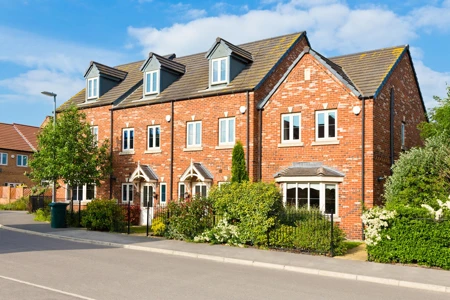The Help to Buy scheme closed to new applicants on 31 October 2022, and formally ended in March 2023. Check out the government’s website for more information if you have an existing Help to Buy account.
Student debt coupled with an entry-level first job can make it tough to save money for your deposit. To help more young people buy their first home, the Government has introduced a number of different Help to Buy schemes.
Help to Buy Equity Loan
Help to Buy Equity Loan allows you to put down a 5% deposit on a new build home of up to £600,000, depending on where you live.
How does it work?
- The government will lend you up to 20% of the cost of your new build home
- You pay a minimum of 5% of the purchase price of the property
- You therefore have up to 25% towards the purchase price of the property, and get a mortgage to cover the remaining 75%
- The Equity Loan is interest-free for the first five years and you don’t need to make any repayments on it during this time
The maximum purchase price depends where you live:
|
Region |
Max. property purchase price |
|
North East |
£186,100 |
|
North West |
£224,400 |
|
Yorkshire and the Humber |
£228,100 |
|
East Midlands |
£261,900 |
|
West Midlands |
£255,600 |
|
East of England |
£407,400 |
|
London |
£600,000 |
|
South East |
£437,600 |
|
South West |
£349,000 |
There are different Equity Loan schemes for England, Greater London, Wales and Scotland, and they all vary slightly.
For more information please click here.
Remember that if your Equity Loan is 20% of the value of the property, and the value of your home goes up overtime, you’ll need to repay 20% of the new value of the property when you sell it. Or pay off your Equity Loan, not the original amount that you borrowed.
Equally, if the value of the property decreases then you’ll be liable to pay 20% of the reduced value of the property at the point you sell it, or when you repay your Equity Loan, not the original amount that you borrowed.
Find out more about the Help to Buy Equity Loan here.
Lifetime ISA
If you’d like to save towards either your first home and you’re over 18 and under 40, you can apply for a Lifetime ISA.
With a Lifetime ISA, you can save up to £4,000 per year, and the Government will give you a 25% bonus on your savings. You can save up to £4,000 per year until you’re 50.
You can use the savings and bonus from your Lifetime ISA towards the purchase of your first home, as long as the house you buy is valued under £450,000.
If two first time buyers are purchasing together, you can combine your savings and bonuses from both of your Lifetime ISAs.
You can find out more about the Lifetime ISA here.
Shared Ownership
If you can’t afford the mortgage on a home, the Shared Ownership lets you buy a share and pay rent on the rest.
Over time, you can choose to increase the size of your mortgage in 1% increments until you own the whole house - this is called ‘staircasing.’
This is ideal for anyone who might be struggling to save the money for a deposit, as you can put down a small deposit on the share you own.
How does it work?
Typically, you would get a mortgage on the share that you buy (between 10-75%), and pay a deposit of 5% on this amount. This makes it easier for those people on lower incomes or who are struggling to save a deposit.
You could apply for Shared Ownership in England if:
- Your household earns £80,000 a year or less outside London
- Your household earns £90,000 a year or less in London
- You're a first time buyer
- You used to own a home previously but can't afford to buy one now in the usual way
- You're an existing shared owner looking to move home
To find out more about Shared Ownership, click here.
When do the current Help to Buy schemes expire?
The Help to Buy Equity Loan scheme will run until 2023, and the Help to Buy Shared Ownership Scheme will end in 2026.
So perhaps with a little help, becoming a homeowner could be closer than you think. Speak to an adviser today to find out what your options are.
Important information
Your home may be repossessed if you do not keep up repayments on your mortgage.
There may be a fee for mortgage advice. The actual amount you pay will depend on your circumstances. The fee is up to 1% but a typical fee is 0.3% of the amount borrowed.

